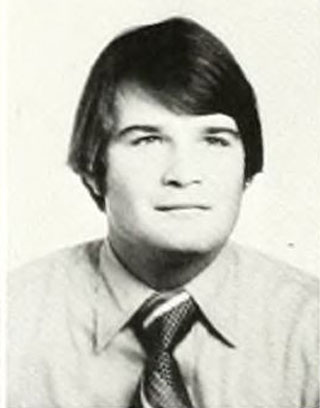
A native of Colonial Heights, Virginia, Glenn Croshaw graduated from ECU in 1972, and then completed his law degree at the University of Virginia in 1975. After practicing law for a decade with Willcox and Savage, P.C., Croshaw was elected to the Virginia House of Delegates in 1986 and retained a seat in that body until 1999. In 2011, Croshaw was appointed to serve on the Virginia Beach Circuit Court.
At ECU, Croshaw’s political interests were already very apparent. After being elected SGA president, Croshaw signed a statement, drafted by Danny Clodfelter, Davidson College student body president and subsequently signed by nine other student body presidents, addressed to presidential candidates running in the 1972 election. The statement emphasized that in 1972 there would be two firsts: North Carolina would have its first presidential primary, and those 18 and older would be able to vote. The statement called on all candidates to make comments on, most prominently, “an immediate end to American military involvement in the war in Southeast Asia” and “a definite plan of action to end overt and tacit forms of discrimination.”
During the visitation controversy of 1971, Croshaw emerged as a vocal, pointed critic of Chancellor Leo W. Jenkins, charging that Jenkins was guilty of “gross neglect of the student body.” Croshaw also informed the press that he and other student leaders planned to put Jenkins on “trial.” Jenkins’ response was that the move was simply a publicity stunt. Croshaw was also among the student leaders behind the business boycott of downtown Greenville as an means of making student dissatisfaction with ECU’s restrictive visitation policy evident.
As SGA president, Croshaw openly supported, along with the presidents of three other regional universities, Governor Bob Scott’s plan for restructuring higher education in North Carolina. Croshaw commented that “pressure politics and false personal pride cannot be allowed to continue to interfere with higher education in a state with as much potential as North Carolina.” Gov. Scott’s plan ultimately led to the creation of the State University System of North Carolina, comprised of 17 campuses; it did so by combining the old Consolidated University of North Carolina, including first and foremost UNC-Chapel Hill, and the recently recognized regional universities, including East Carolina. Croshaw’s support for the restructuring was ironic given that East Carolina’s rise to university status had been made, politically, as a result of its determination for independence and also the application of political pressures of the very sort that Croshaw viewed as antithetical to the best interests of higher education in the state.
In October of 1971, barely half a semester before his term as SGA president was to conclude, Croshaw resigned. He explained, “My primary reason for resigning is the personal realization on my part that I am not and will never be able to participate in the cold and ruthless world of politics. My greatest desire is to be a genuine person once more, not merely a picture on the television or in a newspaper.” Croshaw also mentioned his need to focus on academics especially in light of his decision to apply to law school. The week before, SGA vice president Dave Edwards had resigned for both financial and personal reasons. As a result, interim vice president Tommy Clay became the new SGA president.
His resignation as SGA president notwithstanding, Croshaw evidently found a way to retain his authenticity as a person and make real contributions to political life. A lifelong Democrat and active in politics at the national level as well as in his home state Virginia, Croshaw’s political and professional life after ECU, as a politician and an attorney, both built upon his time at ECU, and reflected well upon, ironically enough, Chancellor Leo Jenkins’ desire to see students active in politics at every level. Despite the distance between them on many issues, Croshaw appears to have learned considerably from Jenkins.
Sources
- Boger, Connie. “Croshaw plans law career.” Fountainhead. Vol. 2, no. 42. March 25, 1971. P. 3. https://digital.lib.ecu.edu/39546
- “Croshaw’s resignation regretted by paper.” Fountainhead. Vol. 3, no. 9. October 14, 1971. P. 6. https://digital.lib.ecu.edu/39582
- “Croshaw seeks restructure.” Fountainhead. Vol. 2, no. 70. August 11, 1971. P. 1. https://digital.lib.ecu.edu/39571
- “Croshaw: SGA wants ‘real governing authority.'” Fountainhead. Vol. 2, no. 72. September 8, 1971. P.2. https://digital.lib.ecu.edu/39573
- “Edwards resigns, claims harassment.” Fountainhead. Vol. 3, no. 7. October 7, 1971. P. 2. https://digital.lib.ecu.edu/39580
- “Executive Council Witnesses New Student Unity.” Buccaneer. 1972. P. 168. https://digital.lib.ecu.edu/15323
- Finman, Holly. Croshaw wins SGA race.” Fountainhead. Vol. 2, no. 44. April 1, 1971. P. 2. https://digital.lib.ecu.edu/39548
- Gibson, Garry. “Trustees cancel all dormitory visitation.” Fountainhead. Vol. 2, Special Issue 3. Freshman Orientation Issue. P. 1. https://digital.lib.ecu.edu/39549
- “Glenn Croshaw and Board of Trustees.” 1971. University Archives 55.01.00.4750. J. Y. Joyner Library. East Carolina University. Greenville, N.C. https://digital.lib.ecu.edu/23429
- “Glenn Randall Croshaw, Colonial Heights, Va.” Buccaneer. 1972. https://digital.lib.ecu.edu/15323
- “Men’s Judiciary.” Buccaneer. 1970. P. 122. https://digital.lib.ecu.edu/15321
- “Plans consumer protection.” Fountainhead. Vol. 2, no. 42. March 25, 1971. P. 9. https://digital.lib.ecu.edu/39546
- “Presidents discuss role of SGA.” Fountainhead. Vol. 3, No. 12. October 26, 1971. P. 1. https://digital.lib.ecu.edu/39585
- “SGA President Croshaw resigns.” Fountainhead. Vol. 3, no. 9. October 14, 1971. P. 1. https://digital.lib.ecu.edu/39582
- “SGA President expresses opinions.” Fountainhead. Vol. 3, no. 11. October 21, 1971. P. 3. https://digital.lib.ecu.edu/39584
- “Student Governments Backing Scott’s Plan.” Asheville Citizen Times. August 8, 1971. P. 6A.
- “Students Planning ‘Public Trial’ of ECU’s Jenkins.” Daily-Times News (Burlington, N.C.). April 20, 1971. P. 18.
- “Student Body Presidents Sign Statement.” Fountainhead. Vol. II, no. 71. August 15, 1971. P. 4. https://digital.lib.ecu.edu/39572
- “Who’s Who Among Students in American Universities and Colleges.” Buccaneer. 1972. P. 100. https://digital.lib.ecu.edu/15323
- Williams, Philip. “Visitation issue served to unite all students.” Fountainhead. Vol. 3, no. 2. September 21, 1971. P. 4. https://digital.lib.ecu.edu/39575
Citation Information
Title: Glenn Croshaw
Author: John A. Tucker, PhD
Date of Publication: 6/25/2019